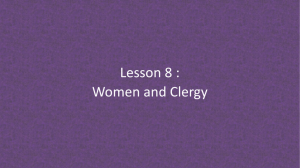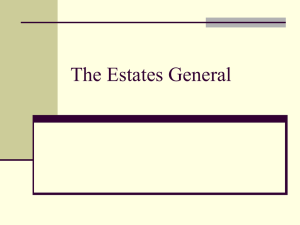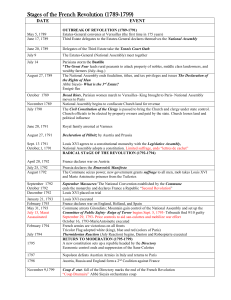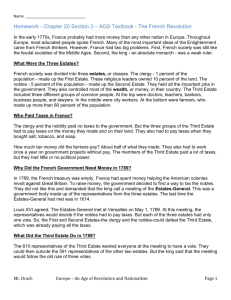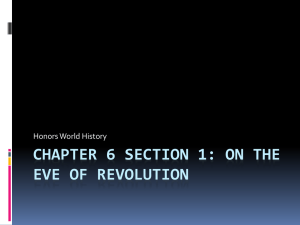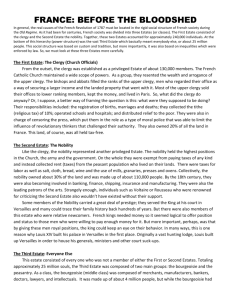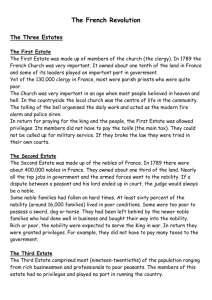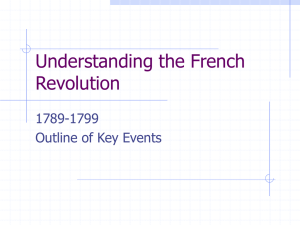AP EURO: LECTURE OUTLINE pp
advertisement
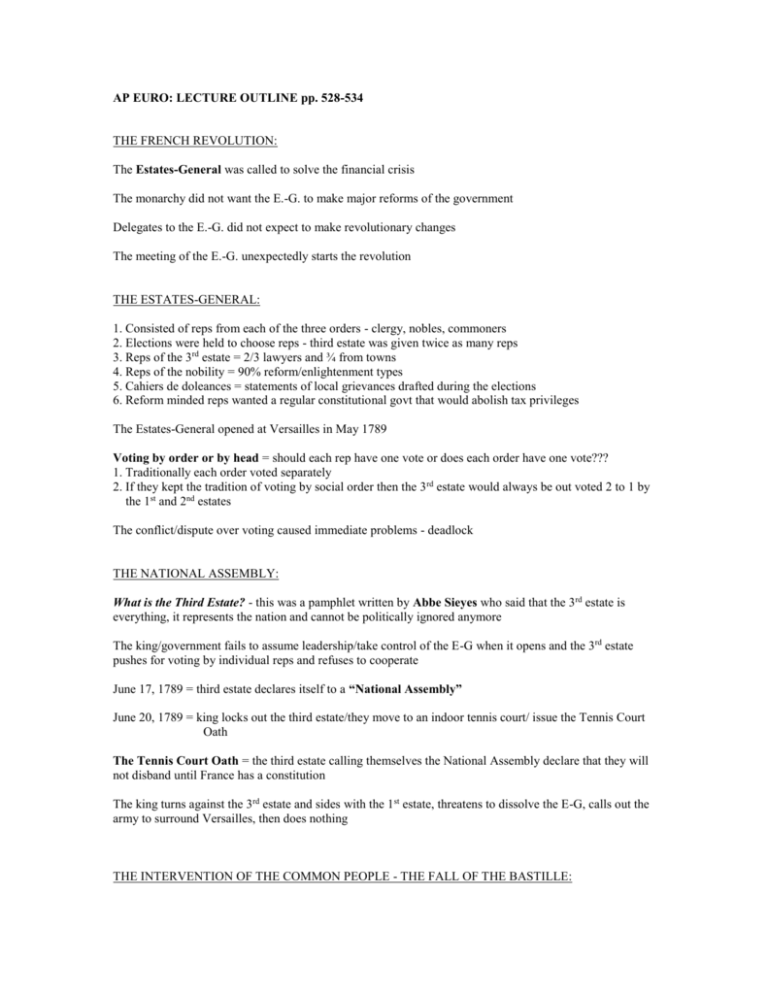
AP EURO: LECTURE OUTLINE pp. 528-534 THE FRENCH REVOLUTION: The Estates-General was called to solve the financial crisis The monarchy did not want the E.-G. to make major reforms of the government Delegates to the E.-G. did not expect to make revolutionary changes The meeting of the E.-G. unexpectedly starts the revolution THE ESTATES-GENERAL: 1. Consisted of reps from each of the three orders - clergy, nobles, commoners 2. Elections were held to choose reps - third estate was given twice as many reps 3. Reps of the 3rd estate = 2/3 lawyers and ¾ from towns 4. Reps of the nobility = 90% reform/enlightenment types 5. Cahiers de doleances = statements of local grievances drafted during the elections 6. Reform minded reps wanted a regular constitutional govt that would abolish tax privileges The Estates-General opened at Versailles in May 1789 Voting by order or by head = should each rep have one vote or does each order have one vote??? 1. Traditionally each order voted separately 2. If they kept the tradition of voting by social order then the 3 rd estate would always be out voted 2 to 1 by the 1st and 2nd estates The conflict/dispute over voting caused immediate problems - deadlock THE NATIONAL ASSEMBLY: What is the Third Estate? - this was a pamphlet written by Abbe Sieyes who said that the 3rd estate is everything, it represents the nation and cannot be politically ignored anymore The king/government fails to assume leadership/take control of the E-G when it opens and the 3rd estate pushes for voting by individual reps and refuses to cooperate June 17, 1789 = third estate declares itself to a “National Assembly” June 20, 1789 = king locks out the third estate/they move to an indoor tennis court/ issue the Tennis Court Oath The Tennis Court Oath = the third estate calling themselves the National Assembly declare that they will not disband until France has a constitution The king turns against the 3rd estate and sides with the 1st estate, threatens to dissolve the E-G, calls out the army to surround Versailles, then does nothing THE INTERVENTION OF THE COMMON PEOPLE - THE FALL OF THE BASTILLE: The King’s calling out the army outrages and inflames people - in Paris the people begin to form mobs and organize themselves Leaders of the people in Paris begin to form a citizens army and go searching for arms and ammunition July 14, 1789 - the storming/fall of the Bastille Bastille = royal armory and prison The Storming of the Bastille marks the end of royal authority in Paris - royal troops in Paris are no longer reliable The city of Paris forms a citizens army = the National Guard The Marquis de Lafayette is appointed commander of the new citizens militia The Tricolor - red, blue and white three bar flag is designed to be the new flag of the Nat Guard and then becomes the flag of revolutionary France Royal authority collapses in the cities - the people form “popular committees” and national guards in cities throughout France Collapse of royal authority in the countryside/rural areas = peasant revolutions in the countryside 1. Peasants refuse to obey the old traditional rules and fees 2. Attack and challenge the local power and privileges of the nobles The Great Fear - summer of 1789/anarchy and uprisings in the countryside DESTRUCTION OF THE OLD REGIME: National Assembly = Constituent Assembly National Assembly 1789-1791 1. The new revolutionary government 2. They are writing a new constitution for France - working to create a system of constitutional monarchy 3. They vote on the night of August 4, 1789 to abolish feudalism and aristocratic privileges 4. On August 26, 1789 they adopt the Declaration of the Rights of Man and the Citizen THE DECLARATION OF THE RIGHTS OF MAN AND THE CITIZEN: 1. The charter of basic liberties of revolutionary France 2. The most important document of the revolution 3. Declared that “men are born and remain free and equal in rights” 4. Government must protect people’s natural rights 5. Political power comes from the people 6. Ended legal inequality 7. Ended tax exemptions 8. Gave all citizens the right to participate and serve in government 9. Outlawed arbitrary arrests 10. Established freedom of speech and press Women’s Rights - leaders of the National Assembly said women have equal civil rights but not equal political rights Olympe de Gouges - woman playwright who wrote that women should have all the same rights as men even equal political rights THE WOMEN’S MARCH TO VERSAILLES: October 5, 1789 - thousands of angry women demanding bread march to Versailles to confront the king and the National Assembly The crowd demand and force the king and his family to return to Paris The people want the king in Paris so they can keep an eye on him and pressure him if needed The king is forced to accept the authority of the National Assembly THE REVOLUTION AND THE CATHOLIC CHURCH: The National Assembly confiscates church lands and declare it to be the property of the government July 1790 - the National Assembly issues the Civil Constitution of the Clergy 1. Bishops and priests were to be elected by the people 2. Clergy were to be paid by the government = become employees of the state 3. All clergy required to swear an oath of allegiance to the Civil Constitution 4. Pope forbids clergy to take this oath - almost half the clergy obey the pope 5. Refractory Clergy - those who refuse to swear the oath/they come to be seen as enemies of the rev. 6. The attacks on the church cause some people to become counter-revolutionaries


